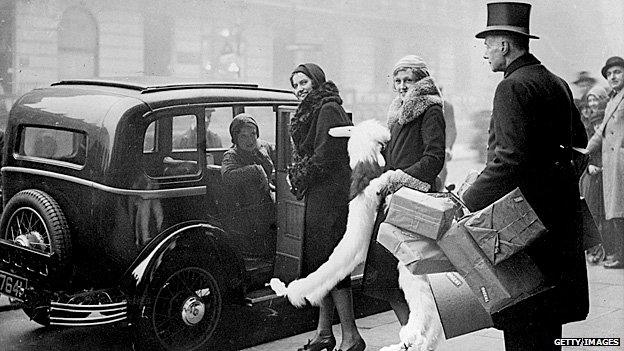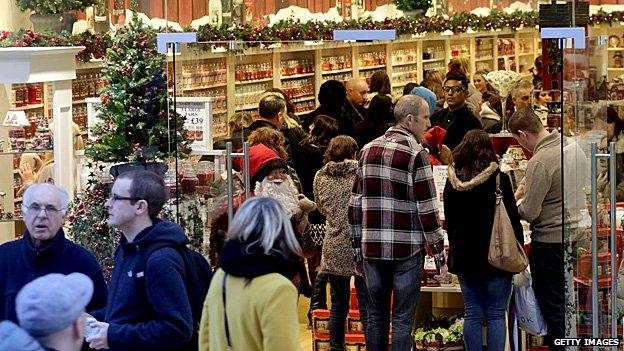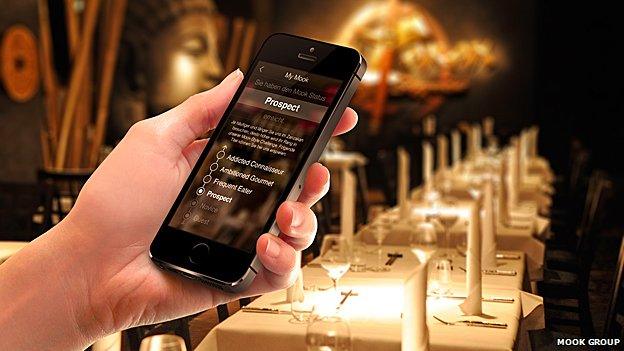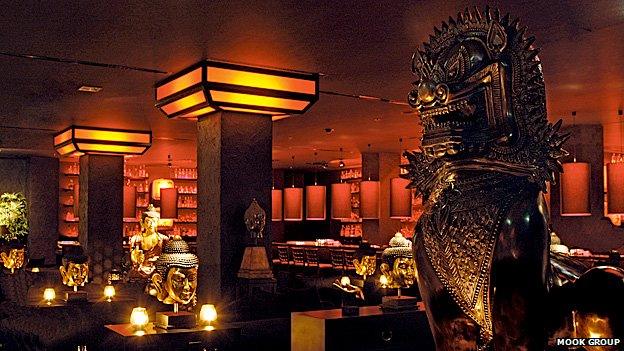Facial recognition: Shop where everybody knows your name
- Published

Shopping has changed quite a bit since these ladies were ushered to their car by a Whiteleys attendant
Imagine walking into a shop you've never been in before, to be greeted by name by a sales assistant you don't know.
If you're David Beckham or Lily Allen you may be used to this type of VIP treatment, but if your fame is more limited, or even non-existent then you might find this attention rather disconcerting.
Despite this, thanks to facial recognition software you don't need to be a celebrity for sales assistants to know your name the moment you enter a shop.
That's because companies such as Japanese technology giant NEC and FaceFirst, a California-based company, offer systems that use cameras placed at the entrances to shops to identify people as they come in.
If your face fits
When important existing or potential customers are spotted, a text message can be sent to appropriate sales staff to ensure they provide personal attention.
"Someone could approach you and give you a cappuccino when you arrive, and then show you the things they think you will be interested in buying," says Joel Rosenkrantz, FaceFirst's chief executive.
Before a system such as FaceFirst's can be put into operation, it has to be loaded up with photos. So an obvious question to ask is where would they come from?

Strategically placed cameras can identify shoppers as they enter a store, so staff can either make a fuss - or have known shoplifters ejected
"You can easily get pictures of famous people, and you could get the pictures of other potential customers from Facebook," he suggests.
"If a particular brand has 10,000 likes on Facebook, you could use the profile pictures of all the people who have liked it."
It would also be possible to get photographs of people who have an account on the retailer's website, if they sign in via Facebook, or simply by taking a photograph of them using their webcam or cameraphone.
"You can tell customers that if they agree to enrol [their face] with their camera, then they will be offered a discount coupon when they walk into the store, or get them to tick a box saying they agree that their picture can be used when they log on with Facebook," Mr Rosenkrantz says.
NEC explicitly markets its system as a way "to identify the presence of important visitors, whether expected or unannounced" but FaceFirst's system is currently being used to recognise known shoplifters and alert security staff so they can be asked to leave.
Mr Rosenkrantz says using its software this way can reduce stock shrinkage by 25% or more.

Facial recognition technology can't make the paparazzi materialise when you arrive at your favourite shop - but it does mean the assistant on the door knows your first name...
Get the message
Facial recognition software can also be useful to identify a customer's age and sex, even if it can't identify a specific individual.
For example, Chicago-based food manufacturer Mondelez International is reportedly working on "smart shelves", which can show messages targeted at specific demographics when people look at the goods on display.
If the system identifies a teenage girl picking up a diet soft drink, it could then display a message that the drink only contains one calorie, while for a middle-aged man it could offer a discount voucher in the form of a QR code.
Tesco is planning to use similar technology in its petrol stations.
So is this type of sex and age recognition effective?
"There is anecdotal evidence that the results can be quite extraordinary," says Tony Stockil, chief executive of retail strategy consultancy Javelin Group.
As an example he cites a campaign in Germany, where a retailer in a train station targeted messages at males of a certain age group, reminding them that the next day was Valentine's Day. This resulted in a high proportion of them buying last-minute gifts.
We are watching
Many retailers are currently experimenting with iBeacons - Bluetooth devices that can detect and record the location of smartphones that have the retailer's app installed as the owner browses the store or simply walks by.

The iBeacons in Zenzakan in Frankfurt let the restaurant's smartphone app know whenever a customer visits

The more frequently a customer goes to the restaurant the higher their "Mook status" in the app
They can then be sent a special offer or discount voucher to tempt them to make a purchase, either in the store or online.
German restaurant chain Mook Group is using iBeacons in a different way entirely.
The iBeacons in its Zenzakan restaurant in Frankfurt let the restaurant's smartphone app know whenever a customer visits.
The more frequently a customer goes to the restaurant the higher their "Mook status" in the app - which can range from "Guest" and "Novice" to "Ambitioned Gourmet" and "Addicted Connoisseur."
"What we have done is use iBeacons for a little gamification of a luxury experience," says Joel Martinez, chief technology officer at Candylabs, the internet marketing company that designed the app. All the data about visits is only stored on the customer's phone, he adds.
That means customers won't be recognised automatically when they enter the restaurant. If they want to receive the perks that their Mook status entitles them to then they have to "self report" by showing staff their status in the Mook app.
"Privacy is very important," Mr Martinez concludes. "We don't want customers to think that the restaurant is monitoring their movements - we want to maintain their privacy."